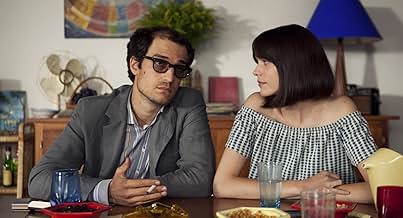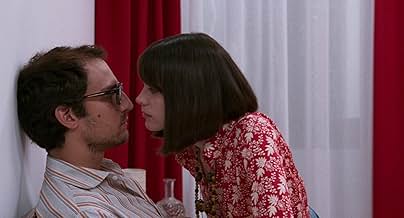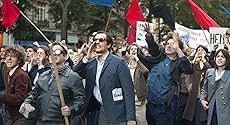Le Redoutable
- 2017
- Tous publics
- 1h 47m
IMDb RATING
6.6/10
6.2K
YOUR RATING
In 1967, during the making of "La Chinoise," film director Jean-Luc Godard falls in love with 19-year-old actress Anne Wiazemsky and marries her.In 1967, during the making of "La Chinoise," film director Jean-Luc Godard falls in love with 19-year-old actress Anne Wiazemsky and marries her.In 1967, during the making of "La Chinoise," film director Jean-Luc Godard falls in love with 19-year-old actress Anne Wiazemsky and marries her.
- Director
- Writers
- Stars
- Awards
- 10 nominations total
- Director
- Writers
- All cast & crew
- Production, box office & more at IMDbPro
Featured reviews
Movies about real historical events and persons from everyday perspective are cool.
This one's about the legendary French director Jean-Luc Godard (played by Louis Garrel) reaching middle-age and marrying a young girl (Stacy Martin). It turns out Goddard, idolized by movie lovers and critcs, turns out to be the immature one in the relationship.
Like any good movie about relationships should, "Le redoutable" has both moments of laughter and soul wrenching drama. But above all, this is a character portrait of a increasingly domineering and unpleasant man.
Writer-director Michel Hazanavicius approaches the study of the character from the deep psychological standpoint. He does not offer some easy and populist way of explaining the reasons behind tormented genius's growing disagreeableness over time.
Just like in real life, there's no one single cause for how one behaves, especially not something external that would be easy to blame and would adequately summarize everything that's going on in human soul (bad influence, broken heart etc).
If the viewer is not willing or able to go that deep, there's still enough going on to justify the time spent. The movie is humorous - especially in the first half - and offers a vivid overview about how destructive immature people can become in loving relationship if they wrestle with power and intimacy issues.
In Godard's character, I found much of myself and what I've had to wrestle with in relationships - and still have to. So watching it was a bit depressing for me, for probably nobody enjoys seeing one's ow faults so clearly from aside (in others).
The second half turns increasingly darker in mood and get exhausting because there's basically only one situation filling the story which gets repeated over and over again. The lack of variety is the reason of me hesitating to give it higher score than 7 out of 10.
The story centers mostly on Godard and young wife, Anne Wiazemsky, and their performances are really good. These are demanding roles because the marital discord doesn't grow from one explosive conflict to another but accumulating stress and tension between two people, expressed mostly in subtle bodily or facial impressions that the camera eagerly catches.
This kind of inner burning based suspense is surely difficult to build on screen, and both stars are really good at it (with the help of the director, of course).
I enjoyed Stacy Martin's performance especially, for in a way, she has fewer resources to build the character than Garrel whose Godard does most of the talking.
Martin gives a beautifully restrained but emotive performance as the ever-suffering wife. She's the emotional backbone of the story and probably the one thing you'll remember the best from the movie.
Based on the memoir of Anne Wiazemsky, who became a novelist and published the book on her life with French cinema genius in 2015. Godard lives on, but she passed away just weeks ago, October 5th this year, succumbing to battle with breast cancer at the age of 70.
Michel Hazanavicius is best known for "The Artist" that got nominated for ten Oscars, and won five, in 2012, including for the best movie and director.
This one's about the legendary French director Jean-Luc Godard (played by Louis Garrel) reaching middle-age and marrying a young girl (Stacy Martin). It turns out Goddard, idolized by movie lovers and critcs, turns out to be the immature one in the relationship.
Like any good movie about relationships should, "Le redoutable" has both moments of laughter and soul wrenching drama. But above all, this is a character portrait of a increasingly domineering and unpleasant man.
Writer-director Michel Hazanavicius approaches the study of the character from the deep psychological standpoint. He does not offer some easy and populist way of explaining the reasons behind tormented genius's growing disagreeableness over time.
Just like in real life, there's no one single cause for how one behaves, especially not something external that would be easy to blame and would adequately summarize everything that's going on in human soul (bad influence, broken heart etc).
If the viewer is not willing or able to go that deep, there's still enough going on to justify the time spent. The movie is humorous - especially in the first half - and offers a vivid overview about how destructive immature people can become in loving relationship if they wrestle with power and intimacy issues.
In Godard's character, I found much of myself and what I've had to wrestle with in relationships - and still have to. So watching it was a bit depressing for me, for probably nobody enjoys seeing one's ow faults so clearly from aside (in others).
The second half turns increasingly darker in mood and get exhausting because there's basically only one situation filling the story which gets repeated over and over again. The lack of variety is the reason of me hesitating to give it higher score than 7 out of 10.
The story centers mostly on Godard and young wife, Anne Wiazemsky, and their performances are really good. These are demanding roles because the marital discord doesn't grow from one explosive conflict to another but accumulating stress and tension between two people, expressed mostly in subtle bodily or facial impressions that the camera eagerly catches.
This kind of inner burning based suspense is surely difficult to build on screen, and both stars are really good at it (with the help of the director, of course).
I enjoyed Stacy Martin's performance especially, for in a way, she has fewer resources to build the character than Garrel whose Godard does most of the talking.
Martin gives a beautifully restrained but emotive performance as the ever-suffering wife. She's the emotional backbone of the story and probably the one thing you'll remember the best from the movie.
Based on the memoir of Anne Wiazemsky, who became a novelist and published the book on her life with French cinema genius in 2015. Godard lives on, but she passed away just weeks ago, October 5th this year, succumbing to battle with breast cancer at the age of 70.
Michel Hazanavicius is best known for "The Artist" that got nominated for ten Oscars, and won five, in 2012, including for the best movie and director.
It is such a pity that it was not enough for the director to talk about Godard, he also tried to make a film in Godard's style. In my opinion, he was not able to capture the "Godard mood" at all. Instead, the film is executed in a textbook manner, meticulously using Godard's cinematic language like a receipt and that's always a risky move (for example, Gus Van Sant's case with Psycho). Godard is Godard not for using these elements, but because he used them at the right time and in the right way. If this would have been done by breaking new grounds in cinematic language, or even without breaking the mould in such a way BUT finding the right tone, I would have liked the film much more. Godard's world has a sexy, humorous yet tragic atmosphere, where the viewer feels for the characters. To be honest, when watching a Godard movie, I'm always terribly envious that I was not born at the time of Belmondo. Here, I did not feel this longing, sadly. Having said that, the actors are cute and the director seems to be cool and all, judging from interviews, so it may be that I'm just too sentimental. :)
First, I can't think of any other film that treats the life of a director, except for Greenaway's Eisenstein In Guanajuato, and the far better known Chaplin. To have his life immortalized this way, a director would have to be a really fascinating person, and I doubt Godard is.
Second, we see how terribly self-absorbed he is throughout. He seems not to care for any of the people around him. The scene in the restaurant when he insults the old man and his wife should have ended in a fist fight, but cooler heads prevailed. Anne wants to make a film with Marco Ferreri--it will be her eleventh--but Godard objects violently: there's too much nudity. This is his wife who will be seen naked, and he forces Ferreri to shoot her with clothes on. Louis Garrel is especially fine in this scene, while Stacy Martin turns in a performance of some skill which makes me forget about the awful film she did with von Trier.
The best for last: about one hour into the story, we get Godard, Anne, the Bambans, Michel Cournot and the driver packed into a car headed to Paris (they'd have gone by train, but for the general strike). Cournot is down because his first and only film hasn't been shown at Cannes, Godard throws some gratuitous insults at him, and the Bambans join in. It's the ultimate bad car trip.
Second, we see how terribly self-absorbed he is throughout. He seems not to care for any of the people around him. The scene in the restaurant when he insults the old man and his wife should have ended in a fist fight, but cooler heads prevailed. Anne wants to make a film with Marco Ferreri--it will be her eleventh--but Godard objects violently: there's too much nudity. This is his wife who will be seen naked, and he forces Ferreri to shoot her with clothes on. Louis Garrel is especially fine in this scene, while Stacy Martin turns in a performance of some skill which makes me forget about the awful film she did with von Trier.
The best for last: about one hour into the story, we get Godard, Anne, the Bambans, Michel Cournot and the driver packed into a car headed to Paris (they'd have gone by train, but for the general strike). Cournot is down because his first and only film hasn't been shown at Cannes, Godard throws some gratuitous insults at him, and the Bambans join in. It's the ultimate bad car trip.
This bizarre mélange of genres--documentary, comedy, tell-all from a former lover--views above all like a hit job. This is the second film I encountered this week which focuses on a disgruntled former girlfriend´s unhappiness that her extraordinary lover turned out not to be entirely normal. (The other one was Mad to be Normal, about Scottish psychiatrist R.D. Laing). I find this sort of depiction of Godard, on the one hand, and R. D. Laing, on the other, to be disagreeable in the extreme. I have no difficulty believing that men with big personalities and egos are difficult to have relationships with. But to make an entire film about what a cad ¨the cad¨ is alleged to be (by a former lover) strikes me as an unvarnished act of revenge. Nietzsche (and probably Godard, since he has always liked Nietzsche) would surely identify in this production a consummate expression of ¨ressentiment¨.
It seems to me that there is something rather puerile about falling in love with someone who is an artist (touted by many as a creative genius) and then expecting him to suddenly be the average-joe husband and dad (in the case of R.D. Laing). How could that possibly turn out to be the case? It´s a package deal. You get the extraordinarily wonderful with the extraordinarily difficult to live with. Needless to say, I do not think well of the female protagonist here, who seems to have wanted to profit from what she viewed as her victimhood. Ugh.
I also found confusing that the director tried to imitate Godard´s style--part of the time, but not all of the time--while also trashing him. A confusing and unsatisfying creation, in my opinion. The comedic elements pretty much disappeared by the end, when all that remains is the whiny girlfriend and what is depicted as Godard´s descent into Maoist Marxism.
Godard haters will love this thrashing.
It seems to me that there is something rather puerile about falling in love with someone who is an artist (touted by many as a creative genius) and then expecting him to suddenly be the average-joe husband and dad (in the case of R.D. Laing). How could that possibly turn out to be the case? It´s a package deal. You get the extraordinarily wonderful with the extraordinarily difficult to live with. Needless to say, I do not think well of the female protagonist here, who seems to have wanted to profit from what she viewed as her victimhood. Ugh.
I also found confusing that the director tried to imitate Godard´s style--part of the time, but not all of the time--while also trashing him. A confusing and unsatisfying creation, in my opinion. The comedic elements pretty much disappeared by the end, when all that remains is the whiny girlfriend and what is depicted as Godard´s descent into Maoist Marxism.
Godard haters will love this thrashing.
At the beginning of 1968 Jean-Luc Godard is one of the most highly-respected directors working in French-language cinema. He is influential and admired. He has also just married Anne Wiazemsky, a teenage actress seventeen years his junior. He has the more arty end of the film world at his feet, yet he is feeling restless.
Then erupt the Paris student protests which sweep Godard up in their revolutionary fervour. He becomes a supporter of the movement, and his opinions are in turn sought out by the young leaders (although, in the best tradition of ideologues everywhere, they also spend a large amount of their time arguing). As his marriage to Wiazemsky suffers, Godard heads further down what some might describe as a Maoist path, culminating - for this film's purposes - in the establishment of a sort of film-making collective without heirarchy - Godard may be the director, but his artistic vision is subordinate to the will of the workers. Hah!
From the plot description this might seem like a terribly gloomy film; far from it. It is actually very playful: as Godard, Louis Garrel has to deliver directly to camera the line "I bet if you told an actor to say actors are dumb, he would do it"; and a scene where Godard and Wiazemsky (played by the frequently-undraped Stacy Martin) discuss film directors' enthusiasm for nude scenes is played with both actors naked. How accurate Garrel's portrayal is I am unable to say, but for an actor who has rarely before displayed any comedy chops he provides a fine, subtly comic turn here; I particularly like the hangdog look his Godard at times displays.
I am not massively familiar with either Godard or his work; I have little patience with pretention. But this film makes the famed auteur a more accessible - sometimes rather likeable - individual, without glossing over his faults (rudeness; arrogance; a controlling element in his relationship with Wiazemsky). Whether it is a fair representation of him I do not know, but it makes for a very interesting film.
I am not massively familiar with either Godard or his work; I have little patience with pretention. But this film makes the famed auteur a more accessible - sometimes rather likeable - individual, without glossing over his faults (rudeness; arrogance; a controlling element in his relationship with Wiazemsky). Whether it is a fair representation of him I do not know, but it makes for a very interesting film.
Did you know
- TriviaJean-Luc Godard himself called the movie a "stupid, stupid idea". The creators of the film then put this quote on the poster in very large font.
- Quotes
Jean-Luc Godard: Politics is like shoes. There's a left and a right, but eventually you will want to go barefoot.
- ConnectionsFeatured in Filmmelier Drops: O formidável Godard, o cinema e a política (2018)
- SoundtracksAdagio from Piano Sonata No.12 in F, K.332
Written by Wolfgang Amadeus Mozart
Performed by Maria João Pires
- How long is Godard Mon Amour?Powered by Alexa
Details
- Release date
- Countries of origin
- Official site
- Languages
- Also known as
- Godard Mon Amour
- Filming locations
- Paris, France(scenes in Paris in 1967 and 1968)
- Production companies
- See more company credits at IMDbPro
Box office
- Budget
- €11,110,000 (estimated)
- Gross US & Canada
- $82,264
- Opening weekend US & Canada
- $10,994
- Apr 22, 2018
- Gross worldwide
- $1,332,204
- Runtime1 hour 47 minutes
- Color
- Aspect ratio
- 1.85 : 1
Contribute to this page
Suggest an edit or add missing content


































